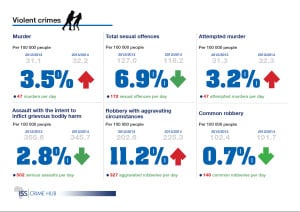Yes, South Africa’s murder rate is 7 times higher than the United States'
This article is more than 9 years old
 Following the murder of South African football captain Senzo Meyiwa, news agencies Bloomberg and Reuters both reported that South Africa’s murder rate is “seven times the rate in the United States”.
Following the murder of South African football captain Senzo Meyiwa, news agencies Bloomberg and Reuters both reported that South Africa’s murder rate is “seven times the rate in the United States”.Crime statistics released by the South African Police Service last month showed that the country’s murder rate had increased for the second year in a row. Between April 1, 2013, and March 31, 2014, a total of 17,068 people were murdered. The previous year’s murder toll was 16,259, around 1,500 more than the United States’ figure for 2012, the last year for which the US has released official data.
Out of every 100,000 people in South Africa, 31 were killed in 2013/14. How does it compare to the United States?
Because the US has not yet released 2013’s figures, we need to step back to 2012. In that year, the United States recorded 14,827 murders at a rate of 4.7 per 100,000 people, according to the UN’s 2013 Global Study on Homicide. Between April 2012 and March 2013, South Africa registered 16,259 murders at a rate of 31.3 per 100,000.
The claim that South Africa’s murder rate is seven times higher than the United States’ is therefore correct when rounded to the nearest whole figure. - 29/10/2014
Additional reading
FACTSHEET: South Africa’s crime statistics for 2013/2014
A guide to understanding crime statistics in South Africa
Blog: Where murder happens in South Africa

Add new comment